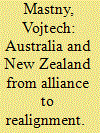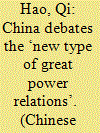|
|
|
Sort Order |
|
|
|
Items / Page
|
|
|
|
|
|
|
| Srl | Item |
| 1 |
ID:
143681


|
|
|
|
|
| Summary/Abstract |
Sino-American debates about the emerging security order in the Asia-Pacific region have not paid enough attention to the perspectives of lesser powers. Among them, Australia and New Zealand, as developed nations increasingly integrated with Asia, are potentially most influential. A historical analysis of their different yet complementary security perceptions and policies suggests diminishing relevance of traditional security structures in the post-Cold War international environment. In the Asia-Pacific region, the established US-centered bilateral alliances are expedient for upholding the status quo, but less so for managing the necessary change. Australia has been at the forefront of promoting the growth of new multilateral regional structures, based on the Association of Southeast Asian Nations (ASEAN), whereas New Zealand has been most successful in developing mutually satisfying relations with China. As desirable strategic partners of both China and the United States, the two middle powers are best suited to promoting a realignment based on common economic interests and values, rather than on balance of power, thus bridging the supposed gap between ‘Asian’ and ‘Western’ values. A Trans-Pacific Partnership including China may eventually become a centerpiece of regional realignment that could serve not only trade but also security by ensuring increasing interaction and understanding among people at all levels―the best safeguard against a slide to military rivalry.
|
|
|
|
|
|
|
|
|
|
|
|
|
|
|
|
| 2 |
ID:
143679


|
|
|
|
|
| Summary/Abstract |
The proposal to forge a ‘new type of great power relations’ is one of the most important diplomatic innovations this Chinese administration has made. Although popular in official discourse, Chinese scholars diverge greatly on how to define the new concept. Debates focus on who the great powers are and what the new relations feature. All are rooted in the vagueness of this concept in official discourse. As the official interpretation of the concept is changing, the debate is also narrowing to that of the goals of the new relations. However, the revision of this concept makes it less practical due to its disconnectedness with the reality of China–US relations. The revised expression also diminishes the uniqueness of the new relations proposal, which implies that it may no longer be a feasible guide to China–US relations or an effective framework for academic studies on the power transition between existing and established powers.
|
|
|
|
|
|
|
|
|
|
|
|
|
|
|
|
| 3 |
ID:
143680


|
|
|
|
|
| Summary/Abstract |
The bargaining for a new role in world politics presents a rising power with a strategic dilemma, as the new role entails a new power position in the system and a new social status in international society. China’s assertiveness in diplomacy after 2008 can be seen as a ‘role bargaining’ process between China and the outside world, such as China’s bargaining for a new role in the global financial system through the Asian Infrastructure Investment Bank (AIIB). This article aims to examine how a rising power can bargain for the new role in a peaceful way. Based on rational bargaining theory and on role theory, we suggest four strategies whereby a rising power bargains for a new role: costly signalling, self-restraint, role-diversification, and alter-casting. Through focusing on China’s World Trade Organization accession and integration into the global economy after the Cold War, we examine the utilities and limitations of these four role-bargaining strategies for a rising power in the international system. The first two strategies aim to address the information and commitment problems concomitant with rationalism that a rising power faces in negotiating a new power position, and the last two strategies focus on how a rising power can bargain for a new social role by balancing the self’s role conception and the role expectations of others.
|
|
|
|
|
|
|
|
|
|
|
|
|
|
|
|
| 4 |
ID:
143678


|
|
|
|
|
| Summary/Abstract |
How will China’s rise to great power status affect its foreign policy and world order? This article argues that China’s future policies will depend on how it defines its identity relative to the United States and other powers, and how others respond to China’s self-definition. For insights, I draw on social identity theory (SIT), from social psychology, which holds that states seek to maintain a positive but distinctive identity. China wants to restore its previous status as a great power, but at the same time to preserve its culture and norms, without assimilating Western liberal values. According to SIT, states that want to improve their status may pursue social mobility, social competition, or social creativity. Social creativity seeks to attain pre-eminence in a different domain from that of the leading powers. Social creativity—the strategy that China has generally followed since the end of the Cold War—appears to be the most desirable and feasible path for China’s rise and peaceful integration into the international system.
|
|
|
|
|
|
|
|
|
|
|
|
|
|
|
|
|
|
|
|
|